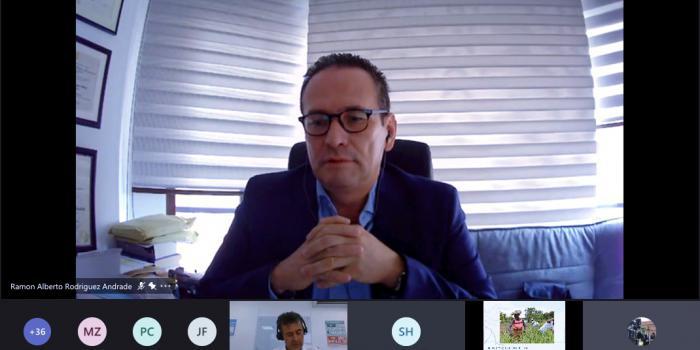
Unit for the Victims held a meeting with the UN Office for the Coordination of Humanitarian Affairs (OCHA)
The Victims Law balance and its extension were shared in this session led by the Unit’s Director.

The Unit for the Integral Victims Attention and Reparation’s Director, Ramon Rodriguez Andrade, introduced a 1448 Law (Victims Law) assessment in a virtual meeting with the OCHA.
According to Director Rodriguez and concerning registration issues, the Single Victims Registry filtering has been guaranteed to solve assessment and update lags. "Today, it can be said there are no delays with new data. Additionally, we ensure statement registration online within the law established deadlines," he said.
Talking about Humanitarian Assistance, he said the following: “A delivery process has been developed. The pandemic forced us to re-evaluate all Humanitarian Assistance subjects including attention at the customer service facilities. However, it has been possible to address both other victimizing events, as well as Humanitarian Assistance delivery to the victim’s population in the national territory.”
Another point highlighted by the Director was compensation payment, which has reached almost 1,200,000 COP; the highest figure in history was achieved last year. "We aided almost 120,000 compensated victims for approximately $1 billion COP. This is President’s Duque commitment, to compensate the most victims possible, but we are also well aware of the compensation payment cost.”
"The closure of 23 Reparation Collective Subjects by December 31st and the compensation payment are worth mentioning Public Victims Policy achievements from the last months," he added.
2021 Challenges
Subject prevention and protection: The Unit’s director said his challenge is to “strengthen coordination and management dynamics between different Government levels. That has been an issue for many years. There are some coordination level dynamics, and there are also achievements with international cooperation in order to complete the entire assistance in its first stage, which is the Humanitarian Assistance.
Registration and information management: The inter-institutional information exchange must be guaranteed and promoted, applying it to the ethnic universe: “Through the National Information Network, Registration has allowed us to filter our database, but it has also allowed us to place the additional components regarding the ethnic universe. This platform permits cross-referencing
more than 67 databases, this helps filtering, but it also confirms who needs to be aided by the Unit.”
Victims abroad: "We need to improve the Abroad Victims Registry. The Humanitarian Country Team has a great opportunity to review how it can be strengthened."
Victims Law Extension
On this issue, the Unit for the Victims’ Director stressed that “the Law will be in place for 10 years to come, which helps us create a general panorama for a decade. However, beyond that scenario, our interest was to extend Law 2078. There we have a question. What will we do the next 10 years to move the reparation route forward? What will we do to repair the most victims and hopefully all of them?”
“We have to make adjustments so that, not being regressive in the victims’ rights they already have, we can go ahead with the route and aid, assist and repair the victims within the territory. This is a great opportunity. We always emphasize to the Humanitarian Country Team and its local teams how important they are as allies, specially to close the gaps regarding assistance subjects. However, we do need support on the institutional strengthening regarding territorial entities for the route to be completed within the territory; with many mayors it is complex to enforce what relates to the victims care within the Law framework.”
Context
The OCHA has been working closely with the Unit for the Victims in the effective coordination with the Local Coordination Teams (ELC in its Spanish acronym), where dialogue spaces have been achieved with the Prevention and Emergency Assistance Sub-directorate (SPAE in its Spanish acronym) in 5 areas at the regional level, covering the most critical points of assistance and emergency prevention.
Similarly, the Unit has managed coordination spaces on the territory completed actions through OCHA, thus improving and complementing the Humanitarian Assistance provided by the Government.
As a humanitarian coordinator, OCHA has been monitoring and seeking correspondence between the actions and the territory real needs. On the other hand, the OCHA checks that these actions also complement the ones carried out by other international humanitarian actors and the State.
(Fin/DFM/COG)






